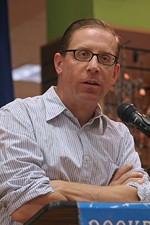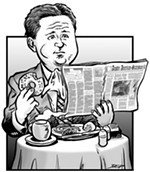Statesman Watch
Keeping Tabs on the Daily's Agenda
By Chris Walters, Fri., June 21, 1996
For instance, Sunday's paper (June16) heralds a major policy statement from Mayor Bruce Todd. Speaking at the inauguration of one returning and two newly elected councilmembers the day before, the mayor says he wants the council to consider privatizing about half the city, more or less. The story runs across the top of the Metro & State section's front page, festooned with an eye-grabbing headline -- "Todd makes push for privatization" -- a handsome color mug shot of the mayor and, off to the left, a color shot of Slusher, Goodman, and Griffith waving and applauding. (Excerpts from Todd's speech also appeared in Monday's edition).
The overall effect is, "Mayor makes major policy statement and, oh, by the way, three councilmembers are sworn in." Without laying claim to telepathy, it looks like things turned out exactly as the mayor intended. The story, by Debbie Hiott, does strive for the objective voice; the lead paragraph reads: "Only months after failing to get the Austin City Council to entertain offers for the city's electric utility, Mayor Bruce Todd said Saturday he wants the city to consider opening up operations in five city departments to competitive bids."
An equally valid approach would have been to run the mayoral story as a sidebar to the inauguration piece, and lead with something like: "Only minutes before the swearing-in ceremony Saturday for three new councilmembers, Mayor Bruce Todd used the occasion to announce that he wants the city to consider privatizing five city departments. `It was an appalling attempt to steal the limelight from them,' said one of the new councilmembers' supporters. `This was supposed to be their day. We already know he wants to dismantle the city.'"
The quote, of course, is made up, but I would lay money that somebody there said the same thing; the room was packed with Goodman, Griffith, and Slusher supporters. And while only a paranoiac would accuse the newspaper and the mayor of collusion, the play given his statement points to an important fact: Agendas often roll along on inertia as well as by dint of active scheming. What was the real story here, anyway? The statement, which had already emerged in pieces over a period of months, or the attempt to seize political initiative from the new councilmembers before the oath of office had left their mouths? The policy story or the political story? These are not rhetorical questions. The policy angle has the virtue of just-the-facts plainness; the unused political angle has the virtue of giving the reader a better insight into what may have really happened.
Paradigm Crawl
Other Statesman attempts at agenda-driving are more blatant, the hand of editorial guidance stripped of its invisibility. A lead story on Tuesday, June 11 was headlined "Utility officials bracing for jolt of deregulation." Written by Laylan Copelin, the story unfurled from a genuine news peg, the decision by the local Service Merchandise store to get electricity from a provider in St. Louis as soon as the Texas Legislature makes it legal to do so. This is interesting, but not earth-shaking. Service Merchandise is a national chain, and has apparently cut a good deal with the St. Louis juice merchant. Undaunted, the reporter crams those two or three paragraphs of solid news into a couple of thousand words of drum-beating on the subject of electric utility deregulation. For readers who are not familiar with the issue, it appeared to be a useful rehash; for those who are, it gave off an unsavory air. The Statesman has covered the deregulation issue to the point of appearing to salivate over the prospect. And the coverage feeds right into Mayor Todd's let's-sell-the-utility agenda. I know, I know: too conspiratorial. Though as Fox Mulder would say, if it's a coincidence, then why does it seem so coincidental?Now, newspapers are not temples of forward thinking, caught as they are in the thrall of breaking events and daily deadlines. So the Statesman deserves credit for trying to anticipate moves the legislature will make six or seven months from now. Though it may be asking too much, in this case the editors would be well-advised to think even further ahead. Copelin's story came close to admitting that the whole thing boils down to an open-fisted grab for fiscal advantage on the part of big corporate customers, putting it almost that baldly. What all of these deregulation stories have so far lacked is the wit to look at the last two or three decades, to the reasons utilities were regulated in the first place, and why nuclear power turned into a fiasco. If they did that, then it might be possible to imagine what will happen a few years from now, when residential customers have had all the shafting they can take.
Call it "paradigm crawl," this uncanny Statesman knack for looking at the big picture and cropping it at the same time. The front page feature on Sunday, June 3, "I-35 underground?," did several things well. It explained the two competing plans for restructuring the barbaric stretch of highway adjacent to downtown, told why some kind of restructuring is considered necessary, and offered illustrations to suggest what renovation might look like.
It did not include any mention of light rail. Not a word. Astonishing, given that the presence of light rail would make a huge difference in the number of cars traveling I-35, and therefore has a lot to do with the question of whether tons of traffic will be poured into downtown on big feeder ramps, as one of the two plans proposes.
Of course, the Statesman did run detailed features on light rail proposals in the past year or so. But the regressive magic of a paradigm crawl occurs when a crucial option is not even mentioned in a context where it clearly belongs. And at least one well-positioned observer thinks this is no coincidence. Speaking at the May 16 council meeting, Max Nofziger blasted the Statesman for ridiculing the pedestrian coordinator position he tried to create. He accused the paper of being hostile to light rail in general, pointing out that it runs an entire section every Thursday promoting car culture. He also decried the recent resignation of Capitol Metro general manager Michael Bolton, saying, according to In Fact, a weekly newsletter devoted to city politics, that "the American-Statesman was a key in bouncing him from that position."
On that point Nofziger scored a clean hit. When the Capital Metro board made a mistake regarding the legality of a light rail referendum, the newspaper held up for ridicule what could have been treated as a minor misstep. Their coverage sparked a chorus of yapping that clearly played a part in Bolton's departure. Nofziger's car-culture argument sounds a little paranoid; it's hard to imagine how light rail would take a significant bite out of the paper's automobile advertising revenue. Nevertheless, there is almost certainly a kernel of truth in the retiring councilmember's remarks, which the Statesman neglected to report, save for an editorial dismissing them as "prattle."
Finally, last week the Statesman offered one other lead that begs for rewriting. "Life After the Council," the front page feature on Wednesday June 12, began thusly: "For Brigid Shea and Max Nofziger, after years of being scorned for wacky, out-of-the-mainstream views, it had to be a sweet moment." The story went on to describe Shea and Nofziger proclaiming June 7 Barton Springs Day, and included interview material as well a gentle review of their council careers. (Reporters Ben Wear and Diana Dworin, to their credit, did include a critical remark Shea made about the daily.)
An equally valid lead: "For Brigid Shea and Max Nofziger, after years of being attacked for trying to represent views shared by a majority of Austin voters, it had to be a sweet moment." See how easy it is to manipulate the authoritative voice? With a little practice, you can do this, too. It's fun. Give it a whirl the next time you pick up a paper.
Next time: Why does local TV news exist? n
Chris Walters is filling in for Hugh Forrest, who is in Portland, Oregon for the summer.
Got something to say on the subject? Send a letter to the editor.








